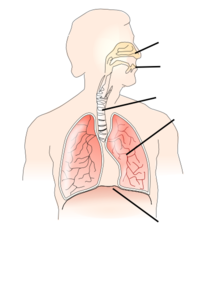By Lee Guion MA, RRT, FAARC
Neurorespiratory Clinical Specialist
ALS affects the mechanical function of the lungs. The major muscles of breathing are the diaphragm (which does most of the work), the intercostal muscles (those between the ribs), and abdominal muscles (necessary for coughing).
The lungs act like a pump, moving air in and out. When you breathe in the diaphragm moves downward and the rib muscles expand outward, allowing air to flow easily into the lungs. Like a stretched rubber band, elastic recoil brings the lung muscles back to their resting position on exhalation.
As breathing muscles weaken the lungs become less elastic. Stiffer lungs allow less air to flow in. You lose the reserves you once called upon during hard work or exercise. That is why we measure your lung volume at regular intervals, ask about your breathing, and make suggestions for maximizing your lung strength.
Next up: Measuring lung function

